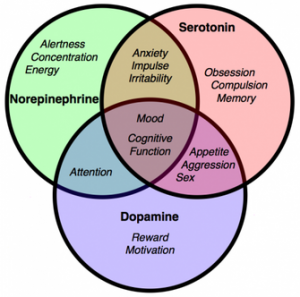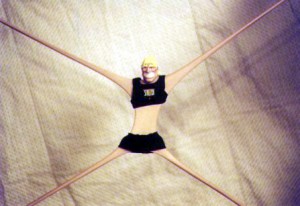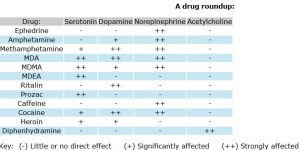 Summary: Distinctions are windows to reality. They are questions asked as the beam of flashlight shine on reality but pointing out only the parts that answer the questions.
Summary: Distinctions are windows to reality. They are questions asked as the beam of flashlight shine on reality but pointing out only the parts that answer the questions.
This article will shine a light on the question: how secure are you in who you are? Do you survive the onslaught of energies of the horizontal, the masses, the Facebook stuff, the “friends”, the media, the Dark Side energies… Can you stay who you are while all that is going on? Do you even know who you are?
My horoscope for this week: VIRGO (Aug. 23-Sept. 22): “I prefer an ecstatic orgasm to a lot of angst,” says Filipino artist David Medalla. I hope you consider making that your battle cry during this Valentine season. It would be in rapt harmony with the current cosmic omens. There really is no need for you to get sidelined by anxiety or distracted by stress when the natural remedy is so easily available. In every way you can imagine, fight off sourness and dourness by engaging in acts of joy and pleasure.
For 13 years I sought and found guidance in Rob Brezsny’s weekly horoscopes. Except maybe three times, it was the perfect “spiritual practice” for me to do… Then something changed. The horoscopes didn’t fit. Didn’t resonate. Didn’t feel high vibration enough to follow. Didn’t click with me…
Did I change? Did Rob Brezsny change?
I don’t know… but at approximately the same time something else happened, let me talk about that.
My errands run… my weekly run-in with the world at large
Every Tuesday, about an hour into my errands run, I would get hyper, talkative, cracking jokes, giggly. Totally not me… Totally out of control… Totally unpleasant… Like I am on drugs.
This been happening for quite a few weeks. I would get more and more hyper, more and more out of control, then I would crash by noon, and would have to spend the day in bed, exhausted.
Losing a whole day a week is not my favorite way to live my life. I don’t rest because it’s my choice, it is because I am deflated, maybe even depressed.
A whole cycle of bipolar or manic depression playing out in a day… weird. It is, apparently, a dopamine infusion early in the day (it’s dopamine that is high when you feel “pleasure”, right?) and then comes the inevitable crash. 1)
The downside of all that excitement
All worldly pleasures, happiness, success, that trigger dopamine, or are an effect of dopamine, result in a crash and a depressed state. It is the worldly light that comes with a shadow. Some are more “solid” than others, and less effected by it.
I am vulnerable. I have forgotten about it.
The Self…
In one of our coaching calls, this past week, the issue that came up with all the participant is a weakness of self, a weakness of core.
When we examined their lives, whenever they were around other people, they had a sense that they lost their self. It’s an illusion: you can’t lose your self, but you can be fully directed by your environment.
I think that when I go out into the world, the same is happening to me. It doesn’t happen when I am around or with people that know who I am, it happens around people that either don’t care who I am, or consider me someone else… like themselves. Just like in the Brave New World… John is me, the un-drugged naturally born man… Go read it or listen to it if you haven’t… it is free.
I am sharing this, not so much to talk about myself, but because I think this is a core issue for everyone, and it needs to be addressed, and remedied, if there is a way.
I need to find a way for you, me, all of us, to strengthen our sense of self, our boundaries, so we don’t become swallowed up and diminished by others.
This is even more urgent for people who live with, work with low vibration people, with energy vampires, with users, with manipulators… most of us, right?
As I was in bed recovering from my two-hour “being in the world” I measured my vibration. It was 200 lower than it was before I left my home in the morning.
I am still in the shock of it, so I haven’t been able to do any work on this, so consider this a “coming attractions” announcement.
I don’t think it’s a simple process to build and protect the Self. Also, certain Soul Corrections have a harder time with it than others. But I do have a sense that it’s possible, and if anyone, I, with the help of my coaching students, will find it, identify it, and make it teachable. I promise.
Some of this work may get done in the Carrot and Stick webinars… and although you can’t participate in the live calls, because we don’t accept new participants, you can sign up and watch the replays. https://yourvibration.com/carrotwebinar
How do you know if you have a strong self or a weak self?
- You may have a negative sense of self, guilt, regret, etc. and you want to be always with other people, if that is not possible, then to just listen to them, watch them, or get involved in some other way.
- You may have a good sense of self, like myself, but have never built boundaries… you may be too trusting, and therefore vulnerable.
- Or you are simply confused inside, never developed? I am not sure that is a third category…
If there is a version or variation I didn’t touch on… and you know you are that, please comment. It’s OK to comment anonymously… I can only imagine how uncomfortable it is to be suddenly visible by all… You need a strong, secure sense of self for that.
“This is your brain.”
The brain has more than a passing similarity to a computer: It gathers information, processes it, stores it, and produces output. Just as different parts of your computer do different jobs, different parts of your brain do different jobs: Some areas of the brain decide what it is you’re looking at, some parts manage how you move your body in order to be able to walk, others turn your thoughts into spoken words and so forth.
As it works, signals fly back and forth, millions at a time, at up to the speed of sound. Besides the ‘task-specific’ regions of the brain, there is a vital system of controls that keep all these subsystems working and synchronized: The modulatory networks.
A modulatory network is a bunch of nerves in your brain that, instead of doing work themselves (like figuring out how to do a math problem) act as control centers, altering how the different parts of the brain work. Think of them as that pushy boss you once had that didn’t seem to really do anything himself, but was always running around telling everybody else what to do. While you may not have had much use for that boss, your brain really does need and benefit from these modulatory networks…when working normally, they keep mental traffic moving smoothly. The modulatory networks wake us up, put us to sleep, make us dream, and so forth. Although they don’t process information themselves (in the traditional sense), they are vital for our state of mind, including our emotions, alertness, etc. There are four major modulatory networks in your brain: Serotonin, dopamine, norepinephrine, and acetylcholine.
Serotonin
Perhaps of the most interesting of these modulatory networks is the serotonergic system. This network of nerves sends messages to the rest of your brain by releasing (or withholding) a chemical called serotonin. Serotonin is important for managing mood, appetite, sleep, and dreaming. If your serotonin levels become low, you may become irritable, anxious, depressed, and have trouble sleeping. The opposite is also true: Antidepressant drugs like Prozac, Paxil, Zoloft, etc. work by increasing serotonin levels, and by doing so often relieve anxiety, depression, etc. Serotonin can have both stimulant and sedative effects.
Beyond your mood, serotonin helps control the flow of thoughts and information in your brain, a little like a a cop directing traffic at a busy intersection. When the serotonin system is strong and active, thoughts flow in a fairly orderly, coherent manner. If serotonin levels greatly drop, thoughts become more scattered and unfocussed. Memory and concentration begin to suffer. Many a person under severe stress knows this feeling of ‘thoughts racing through your head, out of control’.
One particularly interesting role of serotonin is during sleep: When you are in REM sleep (the time when most dreams occur) the serotonin system turns itself off. Chaos reigns, thoughts run wild, vivid fantasies and nightmares emerge. The level of control is so low that the brain starts to generate its own dream sights and sounds and feelings without even needing outside input. While it might not seem relevant to know where dreams come from to a drug user, consider this: Drugs like LSD suppress the serotonin system. LSD can essentially activate your brain’s dreaming mode while you are still awake!
Many popular ‘psychedelic’ drugs work by affecting your brain’s serotonin system. MDMA (“Ecstasy”) works primarily by releasing large amounts of serotonin.
Outside the brain, serotonin promotes the contraction of smooth muscle. Smooth muscle is the kind of muscle that lines our digestive tract and blood vessels. As a result, drugs that act on serotonin can often cause an upset stomach and increases in blood pressure. (One of the more potent serotonergic drugs, DMT, commonly causes vomiting and diarrhea in users when used in an oral form called Ayahuasca.) Most of your body’s supply of serotonin is actually in your blood cells, which, through its vasoconstrictive properties, use it to affect blood flow.
Dopamine
The dopaminergic system is a little less mysterious than the serotonin system, but still of great interest to drug users and scientists alike. Dopamine is most famous for its stimulant and pleasurable effects, and appears to be important in learning. The popular drug Ritalin (prescribed for attention-deficit/hyperactivity disorder) works by elevating dopamine levels, making the user more focused and interested in what they are doing. Drugs that significantly elevate dopamine levels tend to make people euphoric, confident, aggressive, and hyperactive.
In the opposite direction, drugs that can suppress dopamine (Xanax, Valium, Rohypnol, GHB, alcohol, etc.) are sedating, at high doses causing loss of consciousness and amnesia. As a result of their effects, illegal dopamine suppressing drugs have gained a reputation as “date rape” drugs. While they can be used for that purpose, there is no evidence that such crimes are common (or begin to approach even a small fraction of the number of cases of alcohol-facilitated rapes.)
Because they are pleasurable, drugs that strongly elevate dopamine levels tend to be very powerfully ‘re-enforcing’ (meaning the user is often highly motivated to continue use). Of prohibited drugs, the most famous examples of dopamine elevators are amphetamine, methamphetamine, and cocaine. Among legal drugs, the nicotine in cigarettes causes the release of dopamine (among other things.)
Unlike serotonin, the dopamine system doesn’t undergo major cyclic shifts in activity levels during the course of the sleep/wake cycle…it continues to operate at a more-or-less constant level throughout the day and night. MDMA releases a relatively small but significant amount of dopamine.
Highly elevated dopamine levels are associated with some mental illnesses, such as schizophrenia. Prolonged abuse of amphetamines can produce temporary psychosis (losing touch with reality). By the same token, very low dopamine levels also cause problems–the symptoms of Parkinson’s disease are caused by the loss of dopamine neurons.
Norepinephrine
Also called “noradrenaline”, norepinephrine is similar to dopamine in that it also produces alertness, focus and motivation. America’s favorite daily drug, caffeine, releases norepinephrine, helping you get going in the morning and stay mentally sharp. Norepinephrine doesn’t appear to be nearly as strongly re-enforcing as dopamine. Amphetamines usually release significant amounts of norepinephrine as well as dopamine. MDMA releases significant amounts of norepinephrine.
Of prescription drugs affecting norepinephrine, one of the more interesting ones is Modafinil, a stimulant that in Canadian military experiments was able to keep people awake and mentally sharp for days without sleep.
Acetylcholine
Within the brain, the cholinergic system is suppressive (parasympathetic.). That means when acetylcholine levels rise, the brain generally becomes less active; nerves are less able to ‘fire’. This system becomes active during sleep, and may be responsible for disconnecting the brain from the body (so you don’t actually try to run when you dream that you’re running.)
Outside the brain, acetylcholine has a critical role: It’s used by nerves to tell striated muscles to contract. Striated muscles are what people normally think of as muscles…your biceps, etc. Because of this effect, drugs that block acetylcholine receptors (such as curare) can paralyze and kill (by stopping breathing and the heart.) Chemicals that prevent the breakdown of acetylcholine (nerve gas and some insecticides) are also dangerous; as acetylcholine levels rise out of control, muscles can go into spasms, causing heart attacks and difficulty breathing.
A drug roundup:
Drug:SerotoninDopamineNorepinephrineAcetylcholineEphedrine––++–Amphetamine–+++–Methamphetamine+++++–MDA++++++–MDMA+++++–MDEA++–––Ritalin–++––Prozac++–––Caffeine––++–Cocaine+++++–Heroin++––Diphenhydramine–––++Key: (-) Little or no direct effect (+) Significantly affected (++) Strongly affected
(A number of items could be argued; think of this table as a general ‘sense of the thing’, not absolute gospel. Some of these drugs also have major interactions with other receptor/signalling systems, such as heroin’s interaction with opiate receptors.




I must be the third category: underdeveloped sense of self. Not fully present, not fully incarnate, not fully anything. Now I am in the process of looking at that, seeing what is so about it, and seeing the options I have to rise above this state. Guilt, fear, playing small, playing safe, blah, blah, blah…
thank you. let’s explore that on the coaching call
That’s a very interesting point you made Sophie. I feel like I am the same way. I used to feel that for me to live I needed to be around people, now I am happy to be home and feel so much better if I don’t get out.. When I do go meet with people and do things I become like you said on drugs happy and talkative and afterwords I feel drained and I feel like my vibration drops. Interesting…